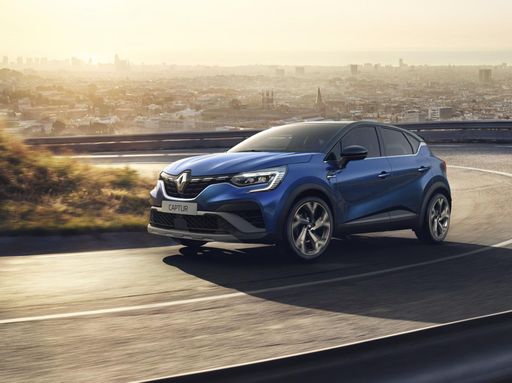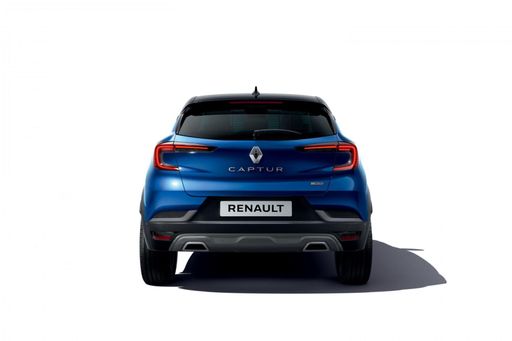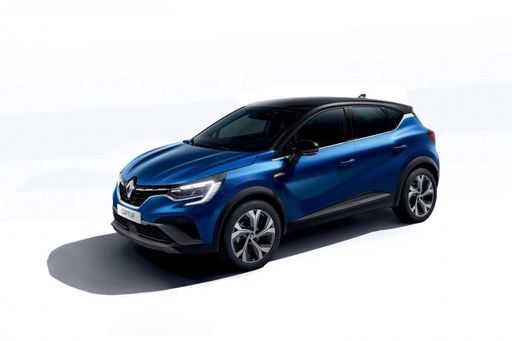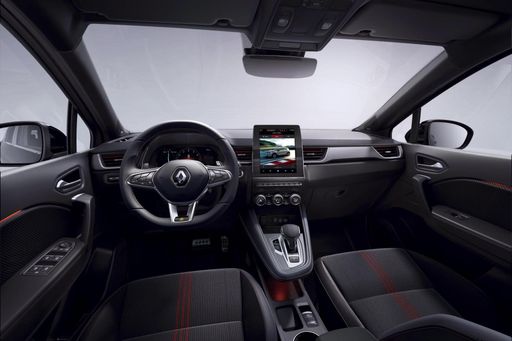Renault Captur VS Toyota C-HR
Renault Captur
The Renault Captur is a compact SUV that combines stylish design with practical functionality, making it a popular choice for urban drivers. Its interior offers a versatile and comfortable space, featuring high-quality materials and modern technology. On the road, the Captur delivers a smooth and efficient driving experience, perfect for both city commutes and weekend adventures.
detailsToyota C-HR
The Toyota C-HR stands out with its distinctive and bold design that combines sleek, angular lines with a sporty posture. Its comfortable and stylish interior is equipped with advanced technology features, providing a seamless driving experience. The vehicle offers impressive handling and performance, making it a compelling choice for those who appreciate a blend of practicality and flair on the road.
details @ renault-presse.de
@ renault-presse.de
 @ renault-presse.de
@ renault-presse.de
 @ renault-presse.de
@ renault-presse.de
 @ renault-presse.de
@ renault-presse.de
 @ Toyota
@ Toyota
 @ Toyota
@ Toyota
 @ Toyota
@ Toyota
 @ Toyota
@ Toyota
 @ Toyota
@ Toyota

|

|
|
|
|
Costs and Consumption |
|
|---|---|
|
Price
about 21200 - 30300
$
|
Price
about 32300 - 46200
$
|
|
Consumption L/100km
4.7 - 7.8
L
|
Consumption L/100km
0.8 - 5.1
L
|
|
Consumption kWh/100km
-
|
Consumption kWh/100km
-
|
|
Electric Range
-
|
Electric Range
67
km
|
|
Battery Capacity
0.6
kWh
|
Battery Capacity
-
|
|
co2
106 - 139
g/km
|
co2
19 - 115
g/km
|
|
Fuel tank capacity
40 - 48
L
|
Fuel tank capacity
43
L
|
Dimensions and Body |
|
|
Body Type
SUV
|
Body Type
SUV
|
|
Seats
5
|
Seats
5
|
|
Doors
5
|
Doors
5
|
|
Curb weight
1358 - 1522
kg
|
Curb weight
1505 - 1755
kg
|
|
Trunk capacity
326 - 422
L
|
Trunk capacity
350 - 447
L
|
|
Length
4239
mm
|
Length
4362
mm
|
|
Width
1797
mm
|
Width
1832
mm
|
|
Height
1575
mm
|
Height
1558 - 1564
mm
|
|
Payload
372 - 383
kg
|
Payload
375 - 425
kg
|
Engine and Performance |
|
|
Engine Type
Full Hybrid, Petrol MHEV, LPG, Petrol
|
Engine Type
Full Hybrid, Plugin Hybrid
|
|
Transmission
Automatic, Manuel
|
Transmission
Automatic
|
|
Transmission Detail
Automatic Gearbox, Manual Gearbox, Automat. Schaltgetriebe (Doppelkupplung)
|
Transmission Detail
CVT
|
|
Drive Type
Front-Wheel Drive
|
Drive Type
Front-Wheel Drive, All-Wheel Drive
|
|
Power HP
91 - 158
HP
|
Power HP
140 - 223
HP
|
|
Acceleration 0-100km/h
8.5 - 14.3
s
|
Acceleration 0-100km/h
7.4 - 9.9
s
|
|
Max Speed
168 - 180
km/h
|
Max Speed
175 - 180
km/h
|
|
Torque
160 - 270
Nm
|
Torque
-
|
|
Number of Cylinders
3 - 4
|
Number of Cylinders
4
|
|
Power kW
67 - 116
kW
|
Power kW
103 - 164
kW
|
|
Engine capacity
999 - 1598
cm3
|
Engine capacity
1798 - 1987
cm3
|
|
Top speed
168 - 180
km/h
|
Top speed
175 - 180
km/h
|
General |
|
|
Model Year
2024
|
Model Year
2024
|
|
CO2 Efficiency Class
C, D
|
CO2 Efficiency Class
C, B
|
|
Brand
Renault
|
Brand
Toyota
|
Renault Captur
The Renault Captur: A Modern Fusion of Style and Efficiency
The Renault Captur has carved a unique niche for itself in the compact SUV segment, combining eye-catching design with advanced technology. As we delve into its technical specifications and innovative features, it's clear why this model continues to captivate automotive enthusiasts and everyday drivers alike.
Under the Bonnet: Power and Performance
The Renault Captur offers a diverse range of powertrains, catering to different driving preferences and needs. Whether you opt for a full hybrid or a mild-hybrid petrol engine, the Captur provides an impressive blend of power and efficiency. The power output ranges from 91 to 158 PS, ensuring a versatile drive whether you're navigating urban streets or hitting the open road.
With a fuel consumption range of 4.7 to 7.8 L/100km, Renault has engineered the Captur with an environmental focus, presenting one of the more economical offerings in its class. The CO2 emissions range from 106 to 139 g/km, adhering to modern demands for reduced environmental impact without compromising on performance.
Technological Innovation: E-Tech Hybrid System
An exciting feature of the Captur is its E-Tech hybrid system, a testament to Renault's commitment to innovation. This system intelligently combines a petrol engine with an electric motor to optimise energy usage, offering both power and efficiency seamlessly. This technology is particularly beneficial in urban settings where frequent stopping and starting can traditionally increase fuel consumption and emissions.
Driving Dynamics and Comfort
The Renault Captur is built with front-wheel drive and offers both manual and automatic transmission options, including cutting-edge dual-clutch systems for smooth gear changes. Offering a maximum torque of 160 to 270 Nm ensures a responsive drive across various terrains. Coupled with its agile handling and a maximum speed range of 168 to 180 km/h, the Captur is as adept on a motorway as it is in city environments.
Comfort has not been overlooked; with five seats and spacious dimensions of 4239 mm in length, 1797 mm in width, and 1575 mm in height, the Captur provides ample space for passengers and luggage alike. The boot space ranges from 326 to 422 litres, accommodating anything from daily grocery shopping to holiday luggage with ease.
Manufacturing Excellence: Safety and Quality Features
Safety and quality are core components of the Captur's design. It features advanced safety technologies and driver-assistance systems, ensuring peace of mind on every journey. The model's CO2 efficiency classes range between C and D, aligning with current environmental standards while still prioritising driver and passenger safety.
Conclusion: A Compelling Choice in Its Class
With a price range between €22,950 to €32,750, the Renault Captur represents a compelling balance of affordability and feature-rich ownership. For those seeking a vehicle that harmonises cutting-edge technology, ecological mindfulness, and dynamic driving experiences, the Captur stands out as a particularly attractive choice in the competitive SUV market.
In summary, the Renault Captur's combination of modern styling, advanced hybrid technology, and practical features places it firmly as a leading contender for anyone considering a contemporary SUV purchase.
Toyota C-HR
Revolutionising the Crossover Segment: The Toyota C-HR
The Toyota C-HR has firmly established itself as a standout contender in the compact crossover segment. Known for its distinct design and hybrid capabilities, the C-HR continues to prioritise innovation and efficiency. In this article, we delve into the technical details that make the 2024 iteration a compelling choice for discerning buyers.
Distinctive Design and Aerodynamics
The Toyota C-HR boasts a striking design that combines angular lines with modern aesthetics. This isn't merely for show; the design enhances aerodynamics, improving fuel efficiency and handling. With dimensions of 4362mm in length and a sophisticated structure, the C-HR strikes a balance between urban agility and on-road stability.
Impressive Hybrid Powertrains
The C-HR lineup offers innovative hybrid and plug-in hybrid drivetrain options. The full hybrid system is tailored for those who seek both economic and environmental benefits. It combines a petrol engine with an electric motor to deliver power outputs ranging from 140 to 223 PS, achieving remarkable fuel consumption rates from 0.8 to 5.1 L/100km. The 2.0 Plug-In Hybrid variant impresses with an electric range of 67 km, ideal for urban commuters.
Unmatched Efficiency and Performance
Acceleration figures for the C-HR range from 7.4 to 9.9 seconds to reach 0-100 km/h, ensuring a responsive driving experience. Maximum speeds between 175 and 180 km/h cater to those who appreciate a bit of zest on the open road. Coupled with CVT automatic transmission and both front-wheel and all-wheel-drive configurations, the C-HR adapts to various driving conditions with ease.
Advanced Technology and Features
Inside, the C-HR is equipped with the latest technology aimed at providing connectivity and comfort. The model hosts an array of features across its diverse trim levels, including Business Edition, Lounge, and the sporty GR SPORT. Each variant is designed to meet the demands of different lifestyles, ensuring there's a C-HR model to suit every taste.
Sustainability and Cost Efficiency
With CO2 emissions ranging from 19 to 115 g/km, the C-HR stands as a testament to Toyota's commitment to sustainability. Financially savvy consumers will also appreciate the running cost, with monthly expenses from €959 to €1204, and a cost per km as low as 38.4 cents. Such efficiency makes the vehicle an attractive option for eco-minded buyers.
Conclusion: A Forward-Thinking Choice
The 2024 Toyota C-HR embodies Toyota's forward-thinking approach to automotive innovation, blending eco-friendly hybrid technologies with stylish design and practicality. It offers a glimpse into the future of driving, where efficiency meets elegance. Whether you're a city dweller or an adventure seeker, the C-HR promises a driving experience that is both enjoyable and environmentally conscious.
